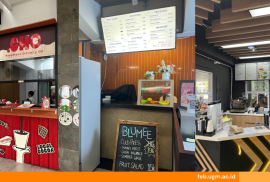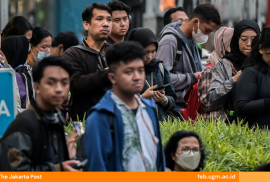Academic writing and publication are now very crucial for academics. One of the factors of existence as an academician is shown by the extent to which research writings and publications have been carried out, and for that an academician needs to continue to study and learn. Therefore, the Publication Unit of the Faculty of Economics and Business Universitas Gadjah Mada (FEB UGM) held a 2021 Publication Workshop. The 2021 Publication Workshop held on Wednesday (11/7/21) and Thursday (12/7/21) online via Zoom Meetings Platform. This event was moderated by Wahyu Saripudin, M.B.A., Lecturer of the Department of Management as well as PIC of the FEB UGM Publication Unit. On the first day the speaker of the Workshop was Gigih Fitrianto, Ph.D. ,Lecturer of the Department of Economics, Muhammad Ryan Sanjaya, Ph.D. as a Lecturer in the Department of Economics, and Rocky Adiguna, Ph.D. namely Lecturer of the Department of Management. Meanwhile on the second day, the speaker was Fu’ad Rakhman, Ph.D. as a Lecturer in the Accounting Department, and Widya Paramita, Ph.D. who is a Lecturer in the Management Department.
Eko Suwardi, Ph.D., Dean of FEB UGM, delivered his remarks to start the 2021 Publication Workshop series. “On behalf of the UGM academic community, I would like to thank the publication unit of FEB UGM and the lecturers. We really hope that you will always improve the quality of research and publications for the present and the future,” he said.
Gigih Fitrianto, Ph.D. started the presentation session on the 2021 Publication Workshop material by sharing and bridging the discussion on how the process of writing and publication is, as well as a sharing session discussing introduction to academic writing in terms of writing which discusses how construction and scientific work were born.
“The academic writing process is an analytical writing process, breakdown of ideas that observes a phenomenon or problem aimed at presenting it constructively and streamlined in a work,” said Gigih.
According to Gigih, in conveying ideas, sometimes in that realm problems are often scattered, from one problem another problem arises. For this reason, it is necessary to have a streamline of these ideas into a constructive structure that tells a good story from beginning to end
Especially in academic writing, Gigih added that it is necessary to plan in dealing with a phenomenon, think critically to get an insight into what is interesting about the phenomenon, to the stage of the editing process where there is a process for publishing the scientific work.
“In order to convey it in the form of scientific work, an idea must be structured based on five points that need to be considered, namely constructive, rational, consistent, streamlined, and objective in nature,” explained Gigih.
According to him, the structure of scientific works in general should consist of an introduction, a research base that includes referencing or logical mapping which is the basis for seeing the existing phenomena. After that, an analytical process is carried out which consists of data collection and alignment to the estimation and analysis process to answer the questions that will be taken in the scientific paper which ultimately leads to conclusions. He concluded that the most important thing is that the idea must be clearly structured and contain what information will be written.
The second session continued with the presentation of M. Ryan Sanjaya, Ph.D., on how to write Abstracts. Ryan explained about the importance of writing an abstract, the key to writing an abstract, and seven rules for writing a good abstract.
“Abstract is the first thing readers see after the title”, he explained.
“Usually we use Google Scholar to search for literature, it is very important to make good and interesting titles and abstracts so that when there are potential paper readers they can be interested in the paper and will read the paper,” added Ryan.
According to Ryan, the abstract summarizes all the important things in research and at least contains abstract elements, namely explaining the background of why the research is important, research problems, research objectives, and explaining the methods and results. Moreover, in some journals there is a maximum of words in the abstract, the policy of each journal is different, there is a maximum of 150 words and 250 words.
In this seminar, Ryan identified the title and abstract of the paper and gave examples of good and correct abstract writing. On the other hand, the most important thing besides the abstract according to Ryan is the research itself, whether the journal is accepted or not depends on the methods and results to be carried out in the research. Although abstract is important, Ryan argues that it is still classified as secondary important, what is more important is the method and analysis carried out.
The last session at the Publication Workshop 2021 on the first day was material presentation from Rocky Adiguna, Ph.D., Rocky discuss about arguments, and how to make sound arguments. Rocky started the presentation of the material by giving a statement of the definition of argument.
“Arguments are the smallest construction of a piece of writing, a collection of arguments forms a paragraph, various paragraphs that are collected into writing. Therefore, we can start from a simple argument that has been developed or create a new one,” explained Rocky.
The basic components of a good argument according to Rocky is having a clear purpose or conclusion, seeing premises supported by relevant evidence, having reasonable logic, clear qualifications, and acknowledging the existence of contradictory arguments. It explains how to place arguments in a paper.
“When we are interested in a topic, there must have been other groups discussing that topic, therefore if we want to enter into a topic we want people to hear our opinion, starting from what they said and after that we just say (our argument) “, he explained.
In closing, Rocky shares a little tips for making sound arguments. Among them is the need for seriousness in speaking both Indonesian and English, as well as developing writing using the question word ‘why’ from each statement that is prepared. In addition, it is necessary to review the accuracy of the premise, and make a separation between write mode and edit mode for writing fluency.
Reportage : Sony Budiarso/Kirana Lalita Pristy




